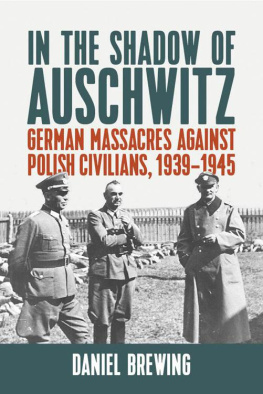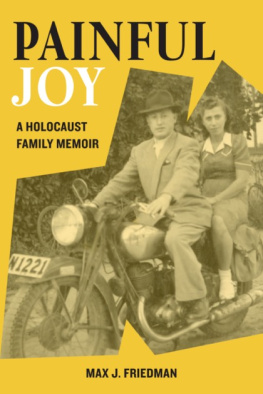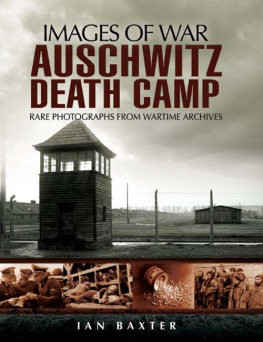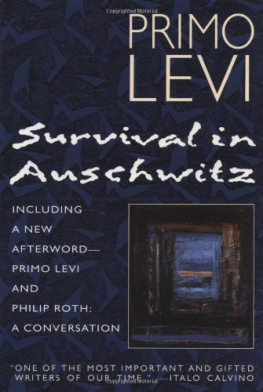Daniel Brewing - In the Shadow of Auschwitz
Here you can read online Daniel Brewing - In the Shadow of Auschwitz full text of the book (entire story) in english for free. Download pdf and epub, get meaning, cover and reviews about this ebook. year: 2022, publisher: Berghahn Books, genre: Romance novel. Description of the work, (preface) as well as reviews are available. Best literature library LitArk.com created for fans of good reading and offers a wide selection of genres:
Romance novel
Science fiction
Adventure
Detective
Science
History
Home and family
Prose
Art
Politics
Computer
Non-fiction
Religion
Business
Children
Humor
Choose a favorite category and find really read worthwhile books. Enjoy immersion in the world of imagination, feel the emotions of the characters or learn something new for yourself, make an fascinating discovery.
- Book:In the Shadow of Auschwitz
- Author:
- Publisher:Berghahn Books
- Genre:
- Year:2022
- Rating:5 / 5
- Favourites:Add to favourites
- Your mark:
- 100
- 1
- 2
- 3
- 4
- 5
In the Shadow of Auschwitz: summary, description and annotation
We offer to read an annotation, description, summary or preface (depends on what the author of the book "In the Shadow of Auschwitz" wrote himself). If you haven't found the necessary information about the book — write in the comments, we will try to find it.
In the Shadow of Auschwitz — read online for free the complete book (whole text) full work
Below is the text of the book, divided by pages. System saving the place of the last page read, allows you to conveniently read the book "In the Shadow of Auschwitz" online for free, without having to search again every time where you left off. Put a bookmark, and you can go to the page where you finished reading at any time.
Font size:
Interval:
Bookmark:
IN THE SHADOW OF AUSCHWITZ
German Massacres against Polish Civilians, 19391945
Daniel Brewing
Translated by Alex Skinner
C ONTENTS
P REFACE
Looking back over an intensive and formative research journey, it is a great pleasure for me to acknowledge all those who have lent me their support in various ways. My thanks go first of all to Klaus-Michael Mallmann. He is the kind of scholar that you rarely come across nowadays. Having inspired this study, he accompanied it through its various stages with great commitment and unshakable confidence exerting gentle pressure at just the right moments. I thank him wholeheartedly for our period of collaboration and for the opportunities that he has opened up for me.
My research was supported by generous grants from the German Historical Institute Warsaw, the United States Holocaust Memorial Museum, Washington, DC, and the Fondation pour la Mmoire de la Shoah. As representatives of these institutions, I would like to thank Eduard Mhle, Suzanne Brown-Fleming and Dominique Trimbur. For the opportunity to present my study in draft form and discuss the first findings in advanced seminars and colloquia, I thank Stefanie Schler-Springorum, Norbert Frei, Peter Brandt, Armin Heinen and Beate Fieseler.Over the years, many friends and colleagues have helped me by exchanging sources and reading texts or simply by being there at key moments. I am particularly grateful to Jochen Bhler. Since we first met over ten years ago, he has been a benevolent and selfless source of advice and support. Jacek Mynarczyk opened doors in Warsaw that might otherwise have remained closed to me. Wodzimierz Borodziej and Jrg Ganzenmller both furnished me with generous support in the initial stages of this project. Discussions with Jrgen Matthus greatly enriched my time in Washington, DC, while Christian Ingrao was always there when I needed his help. Wolfram Pytas comments were extremely helpful in shaping my argument. I also thank my sister, Inka Merhi, and Thomas Dieter, Robert Fuchs, Dieter Konold, Barbara Manthe, Olena Petrenko, Max Ruland, Johannes Schwartz, Frauke Scheffler, Thomas Strobel, Mia Spiro, Katrin Stoll, Christian Tischer, Pascal Trees, Philipp Tribukait, Stefan Wiederkehr and Patrycja Piekowska-Wiederkehr each of whom contributed to the genesis of this study in their own way.This edition of my book would not have been possible without the generous financial support of the Brsenverein des Deutschen Buchhandels. That the Brsenverein selected my book for its Geisteswissenschaften International translation funding programme is a great honour. Alex Skinner did an outstanding job translating the German manuscript into English. Working with him was a pleasure: I am deeply impressed by his accuracy and speed.At Berghahn Books, Chris Chappell, Sulaiman Ahmad, Marion Berghahn and Caroline Kuhtz patiently guided me through the editorial and production process. This was a wonderful experience from start to finish.I owe a special debt of gratitude to my parents, Christiane and Friedo Brewing, who made my studies possible and who have always been there for me with their love and curiosity. This book is for them too. It was my tremendous good fortune to meet Stefanie Coch in the library of the German Historical Institute Warsaw. Without her, this book would never have been written. I dedicate it to her with love and gratitude. Our two wonderful daughters, Ella and Ada, were born after the German edition was published. They couldnt care less about this book. But I hope that someday they might be interested in reading what their father had to say about the terrible past explored in its pages.Aachen, August 2021
I NTRODUCTION

In the spring of 2008, the Frankfurter Allgemeine Zeitung published an article on a dark chapter in GermanPolish history, one supposedly over and done with. Konrad Schuller, the newspapers Eastern Europe correspondent, related the story of Winicjusz Natoniewski, a 72-year-old Polish pensioner who had recently brought a lawsuit against the Federal Republic of Germany at the Gdask District Court.
These wounds were inflicted on Natoniewski as a five-year-old boy living in the village of Szczecyn, southeast of Lublin. On 2 February 1944, German troops led by Konrad Rheindorf, commander of the Ordnungspolizei Against this background, German troops encircled Szczecyn in the early hours of 2 February 1944 and shelled the village with mortars.This phase of unfettered violence was followed by a slower pace of action. The survivors were rounded up and underwent selection in accordance with their ability to work. The younger and stronger were obliged to carry out forced labour,The story of Winicjusz Natoniewski, the destruction of the village of Szczecyn and the murder of its inhabitants leads us into the complex history of Nazi massacres of Polish civilians in the context of the drive to crush partisans. It shines a light on the complexity of a violent event that continues to reverberate into the present day, underlining a number of aspects of relevance to the analysis of massacres; brings out the diverse constellation of actors involved and points up the wide spread of responsibility for the planning and carrying out of massacres; highlights the integration of massacres into the objectives and practice of occupation policy, which constituted a framework for action that determined the pace and extent of massacres, provided opportunities to carry them out and created the prerequisites for their occurrence thus providing the good reasons through which massacres were legitimized; and illustrates the cruelty, excess and unfettered violence entailed in the practice of the massacre thus indicating that there is more to massacres than their apparent objectives. Finally, this story reveals both the disastrous consequences of massacres for survivors and how post-Nazi Germany has dealt with this specific legacy of violence.I consider all these aspects and dimensions in the present study, which is dedicated to German massacres of Polish civilians during the Second World War. I work on the assumption that the use of violence in occupied Poland was not fundamentally a deviant form of action. Concept and ApproachNext pageFont size:
Interval:
Bookmark:
Similar books «In the Shadow of Auschwitz»
Look at similar books to In the Shadow of Auschwitz. We have selected literature similar in name and meaning in the hope of providing readers with more options to find new, interesting, not yet read works.
Discussion, reviews of the book In the Shadow of Auschwitz and just readers' own opinions. Leave your comments, write what you think about the work, its meaning or the main characters. Specify what exactly you liked and what you didn't like, and why you think so.










